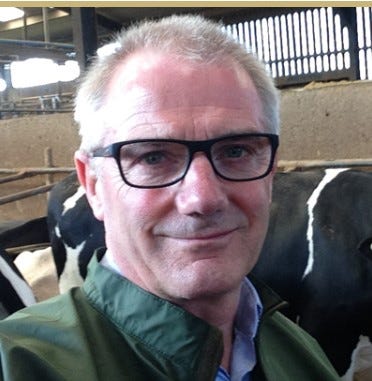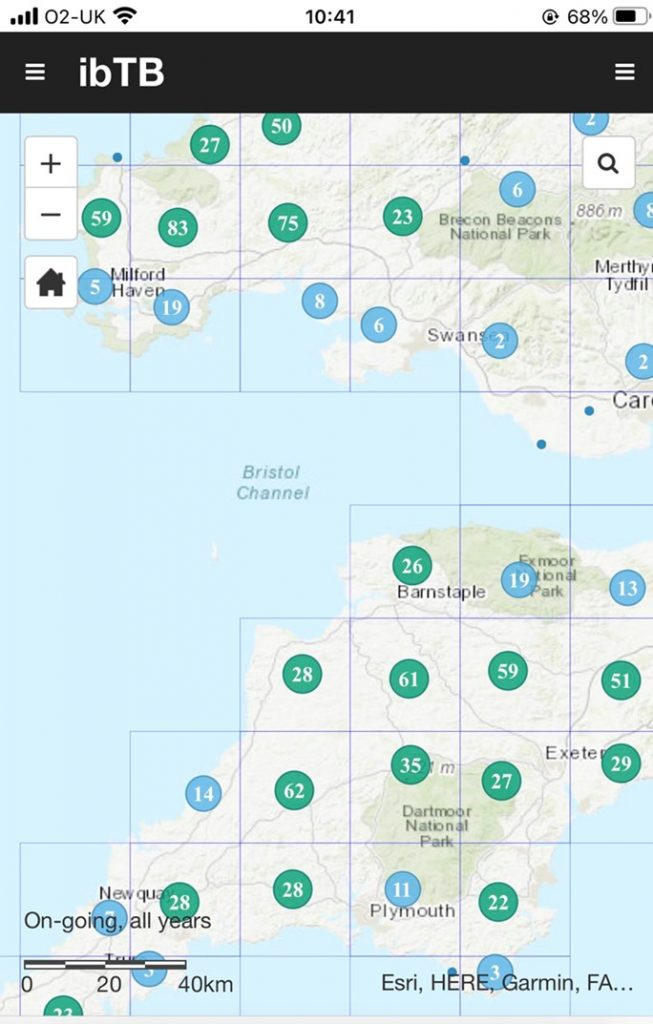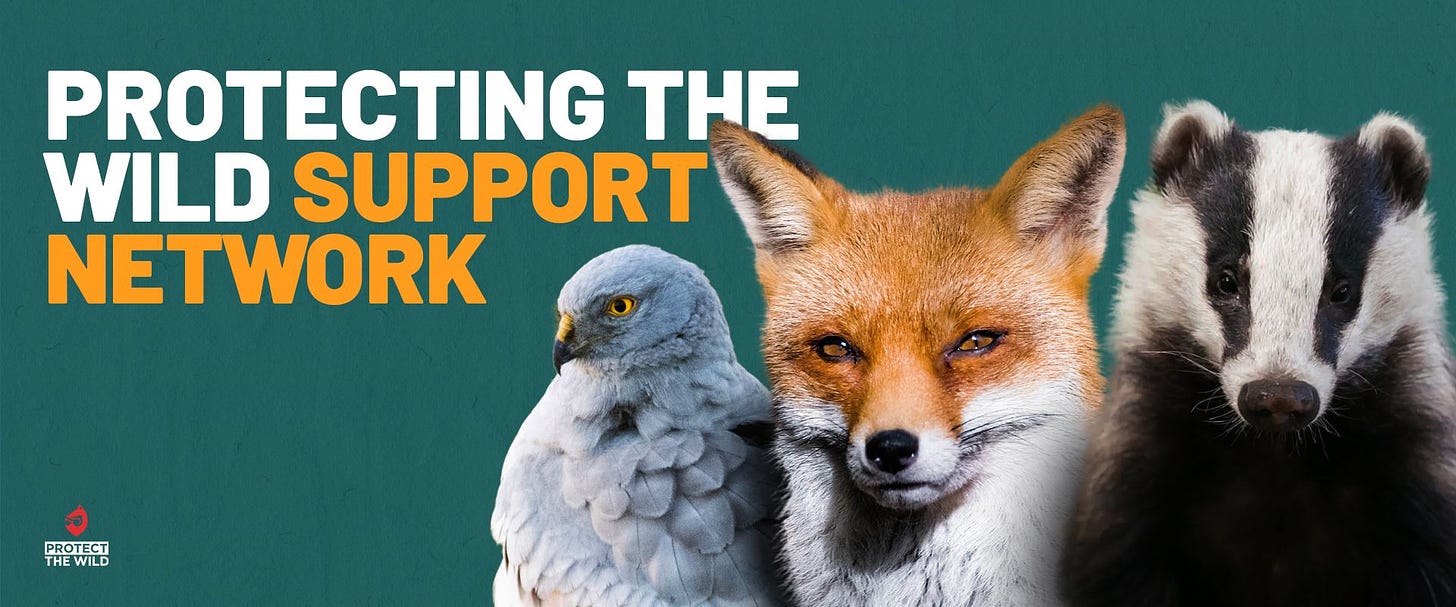The DEFRA Bovine TB Partnership: Shambles or Scandal?
"Not so much a partnership as a captive audience"
A guest blog in collaboration with The Badger Crowd - reporting on badger cull science & legal challenges.

According to TB HuB (the home of UK TB information), the Bovine TB Partnership comprises members with “extensive experience and expertise in the farming industry, private veterinary profession, non-government organisations, academia, local authorities, and government.” It is managed by Defra and has ‘Member organisations’ including the Animal and Plant Health Agency (APHA), National Farmers Union, the British Cattle Veterinary Association, the British Veterinary Association and Natural England.
In recent weeks vet Dick Sibley and others have left the partnership, frustrated at lack of progress, and suggesting that anything not central to Defra’s agenda is not welcome.
Dick Sibley is well known as arguably the foremost English ‘coalface’ veterinary worker on bovine tuberculosis management, in Devon and beyond. He qualified as a vet from Bristol University Veterinary School in 1977 and has been in veterinary practice ever since, and he runs West Ridge Veterinary Practice based in Witheridge, in Mid Devon.
His X/Twitter biography describes him as “Veterinary surgeon working with cattle and other farm animals, hoping to make their lives better & healthier so that they can make our lives better & healthier”.
Dick is dedicated to the care of cattle, with particular expertise in the management of infectious diseases. He has an Honorary Fellowship, awarded for his work with BSE (bovine spongiform encephalopathy), Foot and Mouth disease and Tuberculosis. He is National Secretary and President of the British Cattle Veterinary Association. He has a range of awards; RABDF Princess Anne Dairy Award, the RASE Bledisloe Cup, Honorary Life Membership BCVA, and Dairy Industry Award 2006 for veterinary services to the cattle industry.
Until recently, he was also a member of the government’s ‘Bovine Tuberculosis Partnership’. Towards the end of February 2024 however, it was reported in the farming press that Dick Sibley and another member had been removed from the partnership, and a third quietly resigned. Although it was originally envisaged in 2021 that the partnership would produce useful summaries of their work and make them publicly available, no insight into the thinking of the group has been forthcoming. It has been a closed shop. For the public and interested parties, there has been no insight at all, a huge disappointment considering its role and potential pivotal importance.
In short, the BTB partnership has been a failure. There are even gagging clauses on partnership members speaking publicly without approval.
Shortly after he left the Bovine TB Partnership Dick Sibley started posting on X (formerly Twitter) about his experiences and his posts offer interesting insight both into the problems faced and the workings of the so-called partnership.
By way of introduction to his long social media thread, Sibley pointed out:
“The 3 counties of Cornwall, Devon and Dorset have 7,989 cattle herds and generate 33% of new herd incidents of bovine TB in England. At the end of September 2023. these 3 counties had 652 herds not officially TB free (OTF). (Down from 1011 in 2018, but up from 627 in 2021). I repeatedly mentioned this to the partnership. And got sacked. I guess if you don’t like the message, shoot the messenger.”
So, does Dick Sibley think that the current bTB policy is working well? He says:
“To get the country OTF by 2038 as pledged by DEFRA, I understand we need to get 99.9% of herds tb free for 6 years. In the 3 counties with current herds, that’s just 8 herds still non OTF by 2032. I don’t think that is possible doing what we are currently doing.”
The answer then, is no, he does not think Defra will achieve OTF status by 2038.
The reason behind this is that the current testing system - largely based on SICCT (the single intradermal comparative cervical tuberculin test) and gamma testing - obviously leaves many infected animals in the herd that could only be found with a wider suite of tests, with local management of each unique farm circumstance needed to finish the job.
For that reason, the current system is doomed to failure as amply demonstrated in painful slow-motion across the Republic of Ireland over decades. Testing needs to be constant and not confined to the current routine. Additional/supporting PCR/qPCR (polymerase chain reaction/quantitative real-time PCR) tests in particular. Use of Actiphage for pre-movement herd testing is the single essential action that would curtail disease spread rapidly, even if triggering a new national herd management strategy for diseased herds.
Why would Defra not want to look too closely at embedded infection? Perhaps too many reactors means too much compensation (too much money) seems the most likely explanation. It appears financially uneconomic, and more politically expedient to sit on?
Does Sibley think that the bTB partnership of which he has been a member is a helpful and functioning working group, producing & collating useful and relevant science? He says:
“.. for the past 3 years I have sat dutifully listening to unrealistic ideas on how we are going to replace badger culling with vaccination, BCG the cows and keep testing and killing. Short, truncated discussions on the pros and cons. That’s not a partnership, it’s an audience.”
Again, it looks like the answer is no. It sounds as if there was little engagement with the specialist expertise invited to attend. What does Sibley say about whether he believes badgers are an important source of cattle infection? He says:
“We have tried really hard here in the South West: started culling badgers in 2016 and peaked in 2018: 90% of the area of the 3 counties culling by 2021. More testing, more gamma, more killing, more restrictions and yet 892 herds lost their OTF status last year. Is that success? Of those 892 new herd incidents, most of them weren’t new. They were recurrences of established infections. We used to blame the badgers, but we have now killed most of them. So, as many of us suspected, they are more likely due to undetected residual infections within the herd.”
So, Dick Sibley is concluding that repeat infections are most likely due to undetected cattle infections. Sibley has usefully drawn attention to one of the more irrational of Defra’s many rules and restrictions; you can only test cattle for bTB if they are OTF. He says:
“Trouble is that the permission to test can only be given to herds that are not OTF! As soon as they go clear with a couple of clear skin tests, we can’t use any additional testing. Not even an extra skin test between the six-monthly routines. Endemic infection resurfaces. Nuts.”
There is more in Sibley’s threads: how Michael Gove became engaged in the issue, how that led to the Godfray Review (of the bTB policy), how Defra responded to set up the TB Partnership. But the partnership does not get a good account from Sibley:
“We listened, no decisions. Three quarters of the time taken up with presentations, then truncated discussions through lack of time. The rooms got smaller and smaller and tech more dysfunctional. Covid didn’t help. Frustrating”.
Frustration seems perhaps to be the overriding outcome of the partnership. Sibley writes frankly:
“I asked for targets, objectives, Key Performance Indicators. What was success? Could we have some radical thinking? Ok, maybe I was a bit mouthy. We were told about current policy and plans: phasing out of culling, phasing in of vaccination. But what about the big gap between the two? How could this work?
Task and finish groups did some great work: I co-chaired one on improving testing sensitivity. Brave of them to ask me! Our good group put in hours of constructive discussion and research to produce a detailed report. Radical but realistic. Where is it now? Wasted.
That report even led to a full day workshop held at the APHA site at Weybridge. I really thought that this would do some good and make a difference. A good day of real discussion and proper time spent on difficult issues. Nothing came of it.”
Dick Sibley goes on to cite an interesting case study:
“A small organic herd of red Devon beef sucklers: set up about 10 years ago. Before stocking the 200 acres of rolling Devon grassland, constructs 7km of badger and deer proof fencing. 2” mesh buried 40cm into the ground and going to 6ft+. Even Steve McQueen couldn’t get out.
The herd went down with Tb in 2019, 3 years after being established in its colditz. I got involved in 2021 and started enhanced testing to see what was going on. We SICCt every 60 days in accordance with rules, and then privately gamma, Idexx and phage 3 or 4 times yearly.
Of the 101 cattle that we have tested in the last 3 years, 42 have left the herd as reactors (either SICCT or gamma) and 40 have been designated high risk due to a positive result on another test type. 7 more were gamma positive last week. There is significant age clustering.
We have got 4 day old calves testing positive for antibody! They didn’t make that themselves, they got it from the colostrum. But mothers tested negative. The offspring of some test negative cows (but designated high risk) have all gone as reactors. We suspect mother – calf”.
So despite cattle being reliably isolated from potential wildlife infection, the embedded cattle infection persists.
Sibley’s thread finishes with:
“For those hunting the tb solution, be patient and manage your expectations. There is no simple solution. And for those campaigning for [badger] culling, just take a quick look at ibTB map. My patch is the squares with 61 and 59 in. That’s after 5 years of [badger] culling. Disappointing.”
For those with more than a passing interest, it is worth reading SIbley’s thread in its entirety. If nothing else, it may be the only window into the workings of the bTB partnership that those not actually in it will ever get.
Defra and APHA’s secret world of policy failure. Not so much a partnership as a captive audience of those who need Defra’s support in many ways and will not contradict them for personal and organisations reasons. Gagged to the outside world. It really stinks.
(Edited for length, the full version of this article can be found on The Badger Crowd.)
The Badger Crowd is a grassroots support and fundraising coalition including Badger Groups and Trusts around the UK, the public and a range of charities and funds. The Badger Crowd believes that legal challenges are an important fight, not just for the badger but also for the future of our countryside and the farming industry. The bovine TB badger cull policy is failing farmers, taxpayers and our precious wildlife and is allowing the bTB epidemic to spread and cause hardship and misery to a wide range of people across the country.
Are you working on the front line to protect badgers? Protect the Wild’s Support Network and Equipment Fund can provide equipment like trail cams and night vision optics to badger groups working in the field. We’ve already helped Kirklees Badger Group, Mid Derbyshire Badger Group, Somerset Badger Monitors, and Derbyshire Against the Cull. If we can help you, please let us know by emailing network@protectthewild.org.uk
At Protect the Wild we are campaigning against the ongoing cull and working with key groups like the Badger Crowd who are dedicated to the protection and survival of wild badgers.
By adopting a badger with Protect the Wild you will help fund our efforts to protect badgers and help expose wildlife crimes committed against wild badger populations.
As an adopter, not only will you be helping fund vital work, but you will also receive an exclusive Protect the Wild adoption pack including cuddly toy, glossy photo, and an information fact sheet.








It's general knowledge that badgers have nothing to do with TB infection in cattle. This strengthens that PoV. And, I have not seen ONE good communique about Defra. Ever. Not even on the polluted Wye being steadily poisoned by massive and serious pollution (sadly mostly caused by farmers who I always thought understood and respected the land)... They (Defra) appear to be unfit for purpose.
It’s well known that badgers are being violated and victims of the farming industry. There is 100% evidence badgers DONT cause TB in cattle. DEFRA is an outdated organisation who realise this but can’t “back down” as those vile twats would ALL LOOSE THEIR JOBS…. Well not only should they be unemployed they should be in bloody prison!!!!
When will we realise it’s humans that cause and spread diseases …. Maybe we should start culling humans.